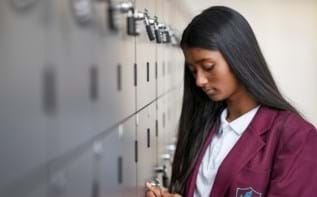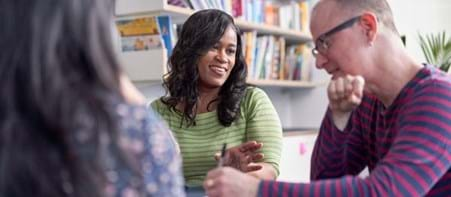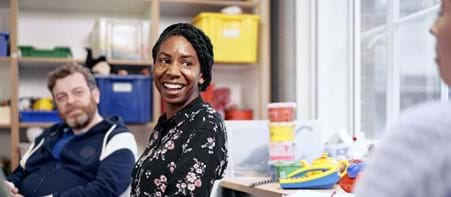1. Get a taste of what it's like being a child counsellor
Place2Be's Taster Day
Our Taster Day will introduce you to our work supporting children and young people through talking, creative work and play. We'll require you to complete a Taster Day before applying for most of our counselling training qualifications.
Introduction to Child Counselling Skills (Level 2 Award)
Our Introduction to Child Counselling Skills (Level 2 Award) is gives you an opportunity to:
- learn theories and techniques used by our mental health professionals in schools
- build communication skills, self-awareness and creative strategies for working with children and young people.
Learn more about our Level 2 Award
2. Start your personal development journey
Being a counsellor involves a lifelong journey of personal development and self-discovery. We suggest you receive counselling yourself before starting training.
The British Association for Counselling and Psychotherapy (BACP) has a Therapist Directory that may help you find a counsellor that suits you. You can also get counselling through the NHS if you meet specific criteria.
3. Take the next step in your counselling training
By now, you should have completed:
- a Place2Be Taster Day
- an eligible Level 2 Award in Child Counselling Skills with Place2Be or another provider*.
Intermediate Child Counselling Skills (Level 3 Certificate)
Our Level 3 Certificate will build on your knowledge and understanding of theories and techniques used by our mental health professionals in schools. You will learn child counselling skills, develop counselling theory and apply everything you learn to home, school and peer-group relationships.
Learn more about our Level 3 Certificate
*Please note if you have a Level 2 Award in Child Counselling Skills from elsewhere, we require you to complete a Place2Be Taster Day in addition.
4. Obtain basic disclosure
A basic disclosure is a criminal record check that you'll need to work with children and young people. If you're applying to work or volunteer with children and young people, this check is often done through the organisation you'll be working with. Otherwise, you can apply via:
- the Disclosure and Barring Service (DBS) if you're in England or Wales
- Disclosure Scotland if you're in Scotland.
If you're going to be working with children and young people in a personal care or healthcare setting, you may be required to undertake an enhanced check.
5. Gain experience working with children and young people
Although it's not essential, we recommend gaining experience with children and young people before pursuing a career as a child counsellor. Hands-on experience has lots of benefits and will help you:
- understand how children and young people develop and how to build trusting relationships with them
- develop effective counselling techniques, observational skills and resilience
- build your understanding of diversity, cultural sensitivities and ethical considerations.
You can gain experience through volunteering, paid work or internships in schools, youth centres, or mental health clinics.
The National Council for Voluntary Organisations (NCVO) has some great advice on how to find voluntary opportunities in your area. You should be able to find paid and internship opportunities on job boards like Children & Young People Now Jobs.
Ready for the next step on your journey to becoming a child counsellor? Find out more about our courses that will qualify you to practice as a counsellor for children and young people, take a look at our How to qualify to practice as a child counsellor page.






